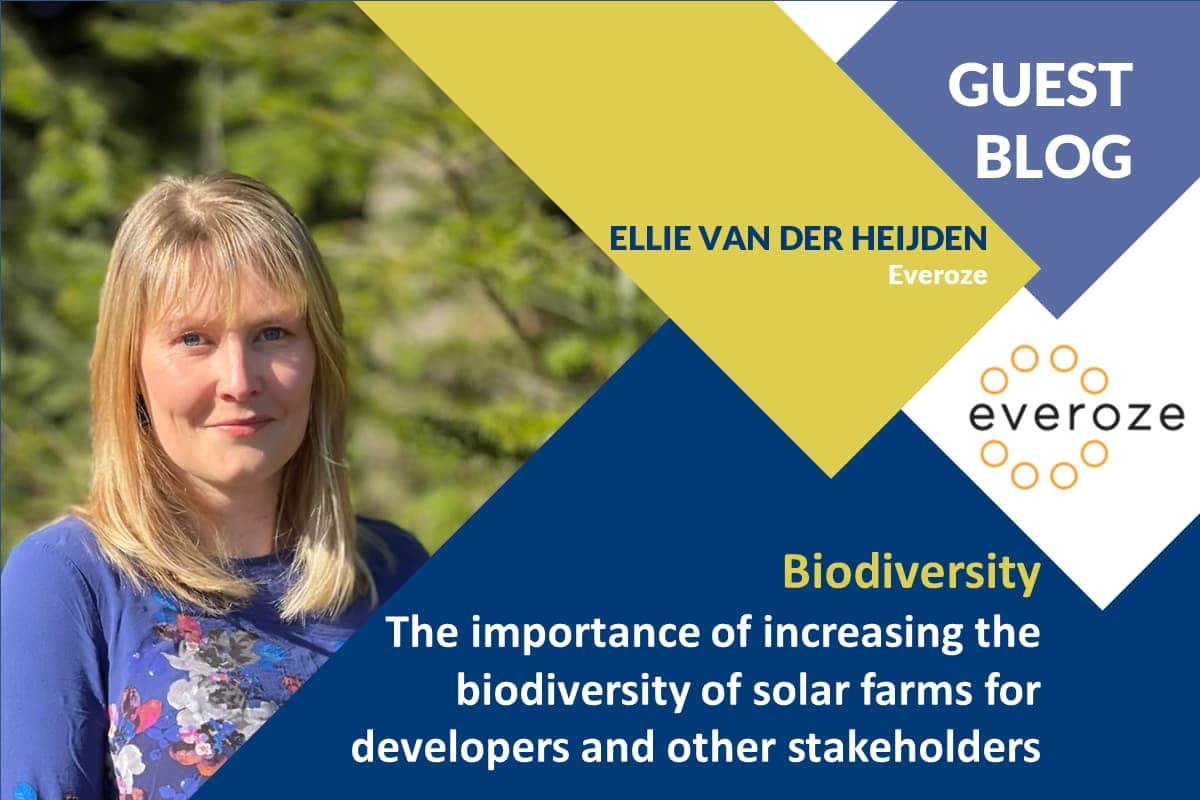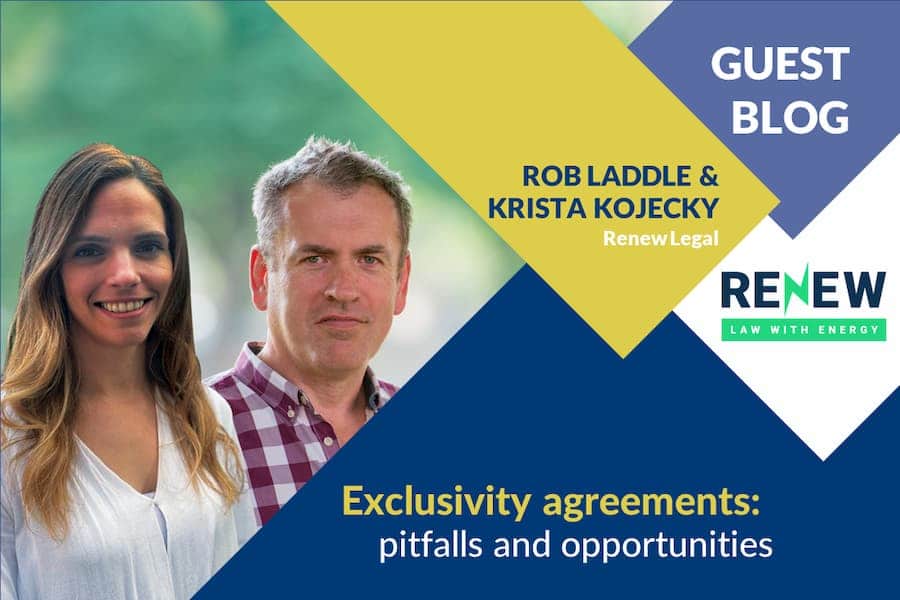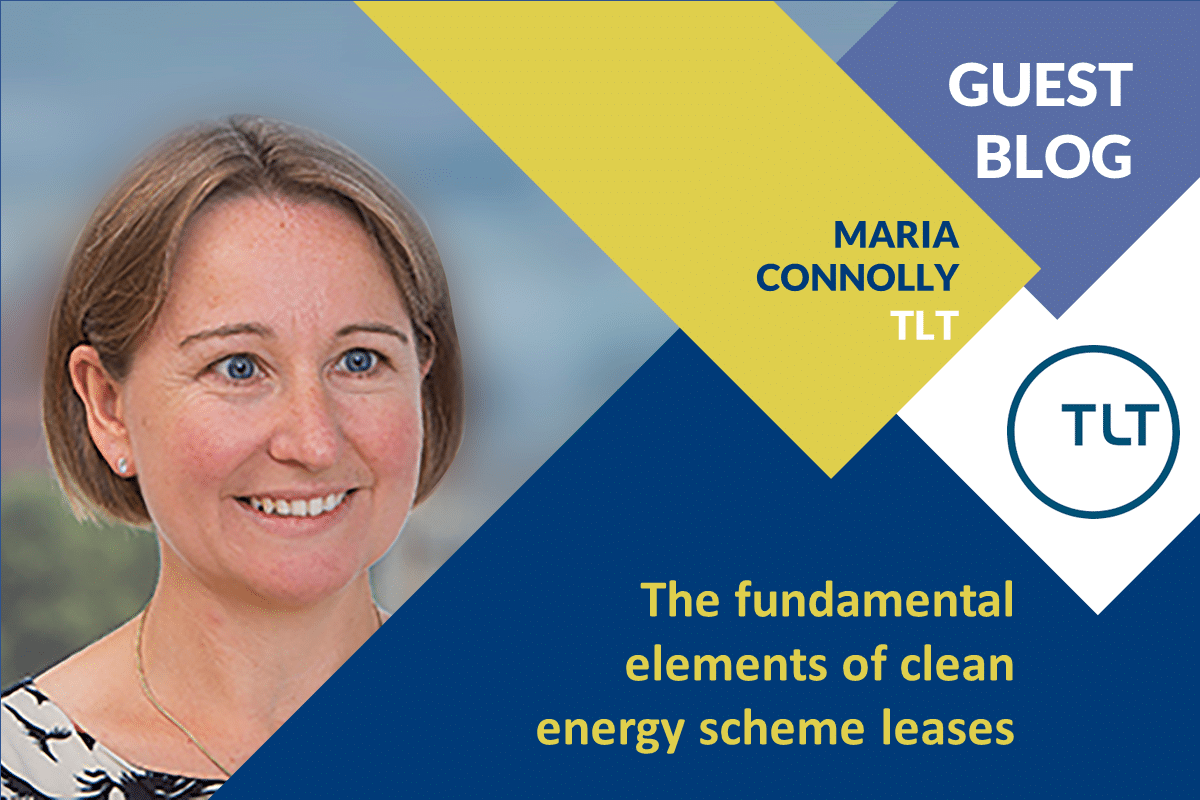The importance of increasing the biodiversity of solar farms for developers and other stakeholders
Everoze’s Ellie van der Heijden spoke to Hugh Taylor about the importance of improving biodiversity of solar farms for developers, and how they can work with landowners and other stakeholders to achieve it. Everoze do fantastic work consulting on renewable schemes across the globe, and Ellie does sterling work in increasing awareness of the importance of biodiversity.
Hugh: Please tell us a bit about Everoze and the work you (Ellie) do with biodiversity and solar schemes.
Ellie: Everoze is an employee-owned consultancy, specialising in renewables, storage and wider energy flexibility. Our unique strength is bridging the gap between the technical and the commercial. We exist to help our clients (including some of the world’s largest renewable investors and lenders) accelerate the transition to a decarbonised energy system. We’re a team of 75 consultants who are flexible, experienced and interdisciplinary.
I’m a Chartered Engineer and have worked in the renewable energy industry for 13 years, both in developer and consultancy roles across a range of technologies (solar, wind, battery storage, biomass). I’m a Partner at Everoze and have been working on a more holistic approach to technical consultancy by raising awareness of the importance of biodiversity on solar farms.
Hugh: Why should improving biodiversity on solar farms be important for developers?
Ellie: Improving biodiversity on solar farms will give developers extra kudos with potential investors.
Investors and lenders are asking more and more questions about the sustainability and environmental performance of solar assets and this trend will continue. Developers that go the extra mile in terms of biodiversity will be rewarded with easier access to finance.
The solar industry has historically been focused on low carbon energy production and playing a key role in preventing the climate crisis but we are also facing a biodiversity crisis. Britain has lost more of its biodiversity than almost anywhere else in western Europe and is amongst the most nature depleted countries in the world. That is shocking!
Focusing on boosting biodiversity is huge opportunity for solar farm owners to have a positive impact beyond renewable energy generation and to improve their own corporate environmental credentials at the same time. In addition, by making biodiversity a key focus of development, developers will find less resistance from planning authorities and greater acceptance by local communities.
Hugh: How can biodiversity be increased?
Ellie: It doesn’t have to be elaborate or expensive, it just requires some thought from the early stages. I’ve never seen a solar park in construction that is short of pallets! These can be reused to create insect hotels. Raising fencing up a few centimetres so that small mammals can pass underneath has no extra cost. In fact, some biodiversity measures such as cutting hedgerows and mowing less frequently, may even save money during the operational phase.
There are huge benefits to considering biodiversity from the get-go, so that the most suitable and efficient spaces for habitat creation can be incorporated into the lease area and site design. It is best to work with an experienced ecologist to establish the baseline conditions and then identify classes of species, for example: insects, bees and butterflies, birds or reptiles, that could be encouraged to thrive through specific habitat enhancements.
The good news is improvements in one aspect of the natural ecosystem on site will have positive knock-on effects on other species. So even minimal expenditure can reap large biodiversity returns.
Clever biodiversity improvements don’t always have to involve additional areas of land at extra cost. It can be as simple as using the awkward corners of a site to locate a pond or habitat pile.
Hugh: What on earth is a habitat pile?
Ellie: Well, it’s a pile of logs and leaves for wildlife to hide in. I told you it doesn’t have to be expensive!
Hugh: What are the benefits to other stakeholders, such as landowners and financers?
Ellie: A key benefit for landowners is that their land is returned to them at the end of the lease in better condition. Many landowners have strong ties to their land which may have been owned or farmed by their family for generations and so the condition of their land is important to them.
The expected operational lifetime of a solar farm will exceed 25 years and when an area is turned over to solar photovoltaic energy generation, this very act means the land is no longer intensively managed, either by ploughing or the application of chemicals. This in itself has a positive impact on soil health which is vital for rebuilding healthy ecosystems but additional active steps which improve habitat and promote biodiversity encourage nature to come flooding back in with positive knock-on effects for surrounding areas.
Investment in ‘sustainable funds’ has intensified over the past two years as these types of funds have been shown to perform well financially. Solar farms that have a positive biodiversity impact above and beyond the basic mitigations required by the planning authority score well on these funds Environmental, Social and Governance (ESG) scores.
Hugh: How can developers and landowners work together?
Ellie: Like any good relationship it is important to talk. If improving biodiversity is important to a landowner, they should make this clear with prospective developers at an early stage. Landowners can assist developers by sharing their knowledge of their land, how it has been used in the past and what species have been observed (or indeed used to be observed), to help developers identify opportunities for quick biodiversity wins.
Developers can help to raise awareness with landowners by explaining how solar farms can be more than just energy generation schemes as they can play a key role in helping to tackle biodiversity loss and improving land quality.
Contact
For more information on how you could increase the biodiversity of your renewable energy scheme, please contact Ellie at ellie.vanderheijden@everoze.com





